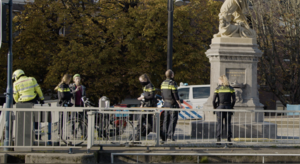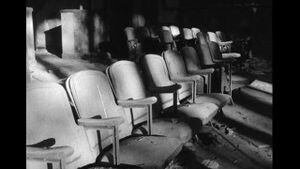Text on practice s.c.p.k: Difference between revisions
Samkoopman (talk | contribs) No edit summary |
Samkoopman (talk | contribs) No edit summary |
||
| Line 2: | Line 2: | ||
~365 days later, I wrestle with crafting a text on practice. Where to start? Thankfully, I have a pool of material to pull from and reflect on. Material that over the last 4.5 months has been bubbling and boiling together, providing me an (un?)conscious path to follow in verbalizing my practice. | ~365 days later, I wrestle with crafting a text on practice. Where to start? Thankfully, I have a pool of material to pull from and reflect on. Material that over the last 4.5 months has been bubbling and boiling together, providing me an (un?)conscious path to follow in verbalizing my practice. | ||
[[File:Dear Moritz.png|thumb|''Dear Moritz -'' still frame]] | |||
The short film I have recently completed, ''Dear Moritz'' is a step towards building my practice on a certain foundation of methodology. This work involves a sort of encounter that I captured in public space, between a civilian and police officers and eventually also a friend of mine and myself. The film intends to give space to viewers to witness reality as it is (through an uncut sequence in 'real' life). But rather than submitting to a doctrine of direct cinema (a movement I have become very fascinated by) I also work with a non-linear editing approach in presenting 'real' life through my own perspective and how I understand it, fragmented and differing in perspective. It conjours up questions of privilege, power relations and authority but it ultimately speaks to discourse surrounding colonial histories, the connection to these in the present day through ideological structure (statues and sculptures of figures, in this case) and how human beings of different backgrounds or mindsets interact, get by or ''feel'' regarding this. The day I shot the film, I was waiting for a friend. We had planned to film something else in his neighborhood, but he was late. It was a sunny Sunday in mid-november. I shot the film independently. I also edited on my own. The structure of the edit was shaped through workshopping and critiques with classmates and teachers. However, the work (and the approach I aim to continue to use) is an essentially collaborative one. The civilian I filmed | The short film I have recently completed, ''Dear Moritz'' is a step towards building my practice on a certain foundation of methodology. This work involves a sort of encounter that I captured in public space, between a civilian and police officers and eventually also a friend of mine and myself. The film intends to give space to viewers to witness reality as it is (through an uncut sequence in 'real' life). But rather than submitting to a doctrine of direct cinema (a movement I have become very fascinated by) I also work with a non-linear editing approach in presenting 'real' life through my own perspective and how I understand it, fragmented and differing in perspective. It conjours up questions of privilege, power relations and authority but it ultimately speaks to discourse surrounding colonial histories, the connection to these in the present day through ideological structure (statues and sculptures of figures, in this case) and how human beings of different backgrounds or mindsets interact, get by or ''feel'' regarding this. The day I shot the film, I was waiting for a friend. We had planned to film something else in his neighborhood, but he was late. It was a sunny Sunday in mid-november. I shot the film independently. I also edited on my own. The structure of the edit was shaped through workshopping and critiques with classmates and teachers. However, the work (and the approach I aim to continue to use) is an essentially collaborative one. The civilian I filmed ended up becoming an acquaintance, and after the filming we developed a collegial relationship, something I am finding (through the enlightenment of other workshops) crucial in being able to open conversations and giving (larger than life) voices to people through moving image/cinema. | ||
[[File:Still-here.jpg|left|thumb|''still/here'' (Christopher Harris, 2001) still frame]] | |||
Creative progression regarding my methods have been made possible through numerous source materials. Since beginning the program at PZI, I have challenged myself to try to watch at least one film per day. Short, mid or full, length- regardless, I must give it my attention, and attempt to think critically or analytically on it, sometimes writing a few lines or a short text of my thoughts. It is through this that I have discovered a deep, rich well of provocative cinema stretching decoloniality, feminism, non-linear and more forms. Makers like Christopher Harris, Chick Strand and Ana Vaz are several that have stimulated particular interest and helped me to understand the non linear approach. In bridging fictional and documentary elements together, recent work by Denis Côté as well as the late legend Abbas Kiarostami continue to fuel the motor of which I intend to run on. Films by Apichatpong Weerasethakul seem to make a certain bridge between these different types of film that I very much appreciate. Ultimately, it provides a pace that I hope to emulate. I suppose ''slow'' is how most would describe it. When I saw one of his films for the first time, I fell deep asleep for 30-ish minutes in the cinema. I can't remember the weather or when that was. For me this low-tempo provides a calmness and room to enter as a viewer and think for yourself. I have simulataneously been on a journey exploring and reading more written texts (something that comes less natural than watching for me). These are often philosophical in nature, pertaining to art but also broader humane contexts. One example of this- ''An Attempt at Exhausting a Day in Paris'' (Georges Perec) provides a writing style that intrigues me in terms of translating this to a visual quality. Observational and hyper-detailed yet relaxed and sprinkled with humour and absurdity. Another book I have been working through ''Artificial Hells'' (Claire Bishop) has helped me map out a better understanding of the historical progression of the avant-garde and the social turn within the arts. Coming from a more 'traditional' background in mainstream film production, it is a challenge to understand non-tangibility in work. I feel that the texts I am reading and the films that I am watching are expanding my understanding to a point where experimentality is becoming less of a challenge and more of a calling for me. | |||
Revision as of 16:46, 25 January 2023
The weather today is cloudy. That is not new, nor the winter air of the city of Rotterdam. It is the end of January, 2023. Things are happening in the world, different from last year but the same in other ways. This time last year, I was word and speech-less in an effort to understand myself as an artist. I was still in the process of application, to sit in the seat I currently sit in.
~365 days later, I wrestle with crafting a text on practice. Where to start? Thankfully, I have a pool of material to pull from and reflect on. Material that over the last 4.5 months has been bubbling and boiling together, providing me an (un?)conscious path to follow in verbalizing my practice.
The short film I have recently completed, Dear Moritz is a step towards building my practice on a certain foundation of methodology. This work involves a sort of encounter that I captured in public space, between a civilian and police officers and eventually also a friend of mine and myself. The film intends to give space to viewers to witness reality as it is (through an uncut sequence in 'real' life). But rather than submitting to a doctrine of direct cinema (a movement I have become very fascinated by) I also work with a non-linear editing approach in presenting 'real' life through my own perspective and how I understand it, fragmented and differing in perspective. It conjours up questions of privilege, power relations and authority but it ultimately speaks to discourse surrounding colonial histories, the connection to these in the present day through ideological structure (statues and sculptures of figures, in this case) and how human beings of different backgrounds or mindsets interact, get by or feel regarding this. The day I shot the film, I was waiting for a friend. We had planned to film something else in his neighborhood, but he was late. It was a sunny Sunday in mid-november. I shot the film independently. I also edited on my own. The structure of the edit was shaped through workshopping and critiques with classmates and teachers. However, the work (and the approach I aim to continue to use) is an essentially collaborative one. The civilian I filmed ended up becoming an acquaintance, and after the filming we developed a collegial relationship, something I am finding (through the enlightenment of other workshops) crucial in being able to open conversations and giving (larger than life) voices to people through moving image/cinema.
Creative progression regarding my methods have been made possible through numerous source materials. Since beginning the program at PZI, I have challenged myself to try to watch at least one film per day. Short, mid or full, length- regardless, I must give it my attention, and attempt to think critically or analytically on it, sometimes writing a few lines or a short text of my thoughts. It is through this that I have discovered a deep, rich well of provocative cinema stretching decoloniality, feminism, non-linear and more forms. Makers like Christopher Harris, Chick Strand and Ana Vaz are several that have stimulated particular interest and helped me to understand the non linear approach. In bridging fictional and documentary elements together, recent work by Denis Côté as well as the late legend Abbas Kiarostami continue to fuel the motor of which I intend to run on. Films by Apichatpong Weerasethakul seem to make a certain bridge between these different types of film that I very much appreciate. Ultimately, it provides a pace that I hope to emulate. I suppose slow is how most would describe it. When I saw one of his films for the first time, I fell deep asleep for 30-ish minutes in the cinema. I can't remember the weather or when that was. For me this low-tempo provides a calmness and room to enter as a viewer and think for yourself. I have simulataneously been on a journey exploring and reading more written texts (something that comes less natural than watching for me). These are often philosophical in nature, pertaining to art but also broader humane contexts. One example of this- An Attempt at Exhausting a Day in Paris (Georges Perec) provides a writing style that intrigues me in terms of translating this to a visual quality. Observational and hyper-detailed yet relaxed and sprinkled with humour and absurdity. Another book I have been working through Artificial Hells (Claire Bishop) has helped me map out a better understanding of the historical progression of the avant-garde and the social turn within the arts. Coming from a more 'traditional' background in mainstream film production, it is a challenge to understand non-tangibility in work. I feel that the texts I am reading and the films that I am watching are expanding my understanding to a point where experimentality is becoming less of a challenge and more of a calling for me.


